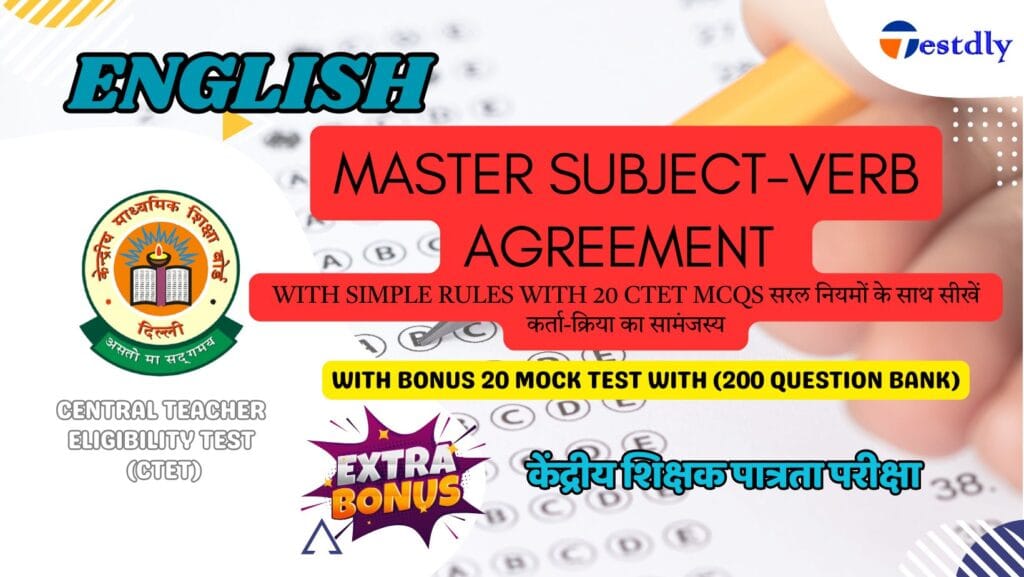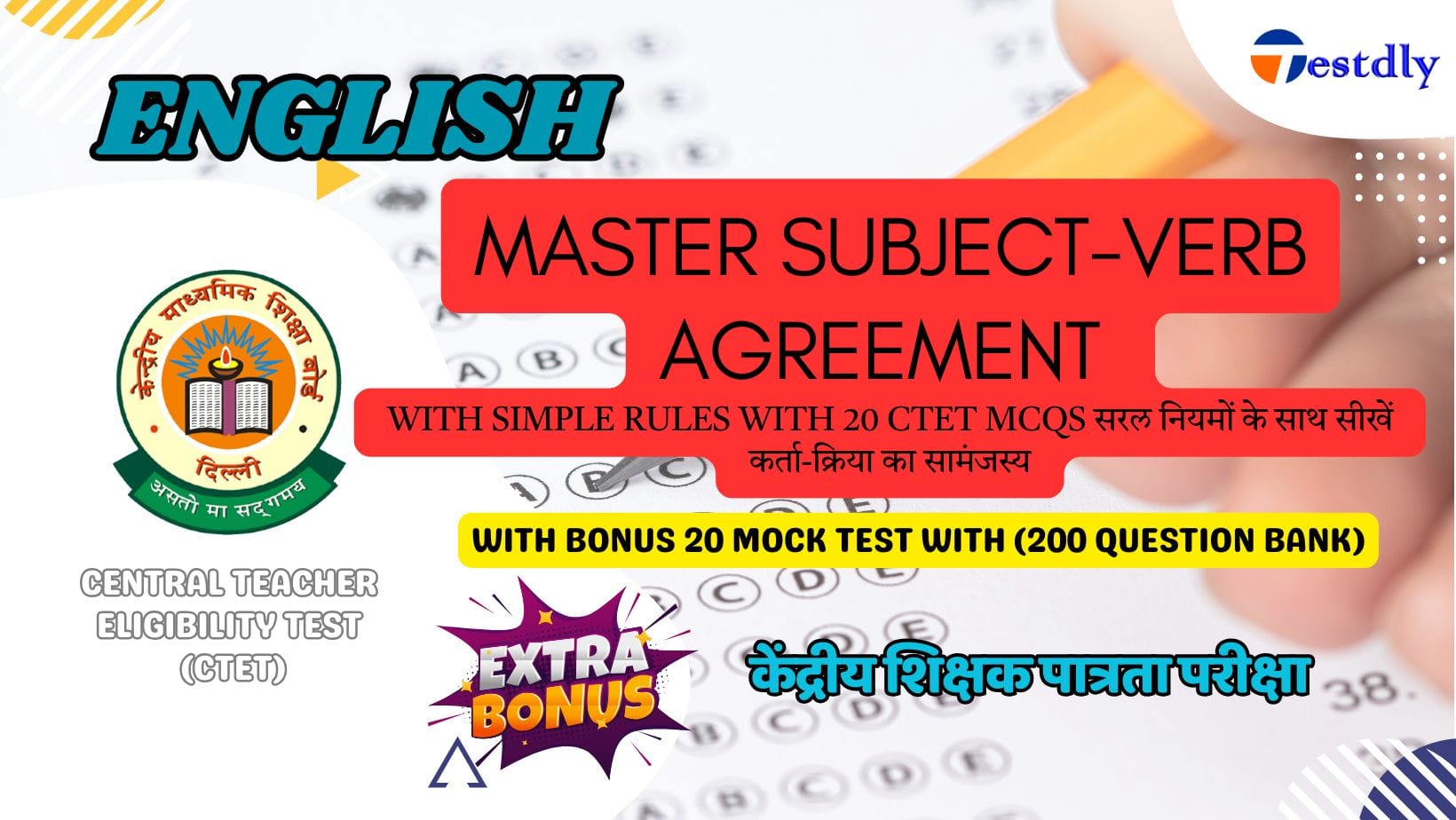Master Subject-Verb Agreement with Simple Rules with 20 CTET MCQs सरल नियमों के साथ सीखें कर्ता-क्रिया का सामंजस्य
join our WhatsApp channel for latest update
Subject-Verb Agreement: Detailed Explanation
Subject-Verb Agreement refers to the grammatical rule that a verb must agree with its subject in both number (singular or plural) and person (first, second, or third).
Key Rules of Subject-Verb Agreement:
- Singular Subject, Singular Verb:
- A singular subject takes a singular verb.
Example: The cat runs fast.
- A singular subject takes a singular verb.
- Plural Subject, Plural Verb:
- A plural subject takes a plural verb.
Example: The cats run fast.
- A plural subject takes a plural verb.
- Compound Subjects:
- When two subjects are joined by “and,” use a plural verb.
Example: John and Mary are going to the park. - If subjects are joined by “or” or “nor,” the verb agrees with the subject closer to it.
Example: Either the cat or the dogs are in the yard.
Example: Either the dogs or the cat is in the yard.
- When two subjects are joined by “and,” use a plural verb.
- Indefinite Pronouns as Subjects:
- Singular: Words like “each,” “everyone,” “someone,” “nobody” take singular verbs.
Example: Everyone is here. - Plural: Words like “few,” “many,” “several” take plural verbs.
Example: Few have completed the assignment.
- Singular: Words like “each,” “everyone,” “someone,” “nobody” take singular verbs.
Master Subject-Verb Agreement with Simple Rules with 20 CTET MCQs
- Collective Nouns:
- A collective noun (e.g., team, family) takes a singular verb when the group acts as one unit but a plural verb when individuals act separately.
Example: The team is winning. (as a single unit)
Example: The team are arguing. (individual actions)
- A collective noun (e.g., team, family) takes a singular verb when the group acts as one unit but a plural verb when individuals act separately.
- Subjects with Quantifiers:
- Words like “a lot of,” “some,” or “all” depend on the noun that follows them.
Example: Some of the water is spilled. (water is uncountable)
Example: Some of the apples are missing. (apples are countable)
- Words like “a lot of,” “some,” or “all” depend on the noun that follows them.
- Subjects Separated by Words:
- Ignore phrases that come between the subject and verb.
Example: The basket of apples is on the table.
- Ignore phrases that come between the subject and verb.
- Titles, Names, and Quoted Words:
- Titles, even if plural, take a singular verb.
Example: “The Tales of Beedle the Bard” is an interesting book.
- Titles, even if plural, take a singular verb.
| 1st test of English | play |
| 2nd test of English | play |
| 3rd test of English | play |
| 4th test of English | play |
| 5th test of English | play |
20 MCQs from Previous CTET Exams
1. Select the correct sentence:
A. Each of the students are ready.
B. Each of the students is ready.
C. Each of the students were ready.
D. Each of the students has ready.
Answer: B. Each of the students is ready.
Explanation: “Each” is singular, so it takes “is.”
2. Identify the correct sentence:
A. The list of items are on the table.
B. The list of items is on the table.
C. The list of items were on the table.
D. The list of items have on the table.
Answer: B. The list of items is on the table.
Explanation: The subject “list” is singular, so the verb is “is.”
Master Subject-Verb Agreement with Simple Rules with 20 CTET MCQs
| QUIZ NO 06 | PLAY QUIZ |
| QUIZ NO 07 | PLAY QUIZ |
| QUIZ NO 08 | PLAY QUIZ |
| QUIZ NO 09 | PLAY QUIZ |
| QUIZ NO 10 | PLAY QUIZ |
3. Choose the correct option:
A. None of the boys has arrived.
B. None of the boys have arrived.
C. None of the boys is arrived.
D. None of the boys were arrived.
Answer: B. None of the boys have arrived.
Explanation: “Boys” is plural, so the verb is plural.
4. Which sentence is correct?
A. Either John or his friends is coming.
B. Either John or his friends are coming.
C. Either John nor his friends is coming.
D. Either John nor his friends are coming.
Answer: B. Either John or his friends are coming.
Explanation: The verb agrees with the nearest subject (“friends”).
Master Subject-Verb Agreement with Simple Rules with 20 CTET MCQs
5. Fill in the blank:
The news ____ shocking.
A. is
B. are
C. were
D. have been
Answer: A. is
Explanation: “News” is uncountable and takes a singular verb.
6. Identify the correct sentence:
A. Mathematics is my favorite subject.
B. Mathematics are my favorite subject.
C. Mathematics has my favorite subject.
D. Mathematics were my favorite subject.
Answer: A. Mathematics is my favorite subject.
Explanation: “Mathematics” is a singular subject.
| QUIZ NO 11 | PLAY QUIZ |
| QUIZ NO 12 | PLAY QUIZ |
| QUIZ NO 13 | PLAY QUIZ |
| QUIZ NO 14 | PLAY QUIZ |
| QUIZ NO 15 | PLAY QUIZ |
7. Select the correct verb:
Some of the water ____ spilled.
A. is
B. are
C. were
D. have been
Answer: A. is
Explanation: “Water” is uncountable and singular.
8. Which is correct?
A. The team is playing well.
B. The team are playing well.
C. The team were playing well.
D. The team has playing well.
Answer: A. The team is playing well.
Explanation: The team is acting as a single unit.
9. Fill in the blank:
A bouquet of flowers ____ on the table.
A. is
B. are
C. were
D. have been
Answer: A. is
Explanation: The subject “bouquet” is singular.
Master Subject-Verb Agreement with Simple Rules with 20 CTET MCQs
10. Choose the correct option:
Fifty kilometers ____ a long distance to walk.
A. is
B. are
C. were
D. have been
Answer: A. is
Explanation: Distances are considered singular.
| QUIZ NO 16 | PLAY QUIZ |
| QUIZ NO 17 | PLAY QUIZ |
| QUIZ NO 18 | PLAY QUIZ |
| QUIZ NO 19 | PLAY QUIZ |
| QUIZ NO 20 | PLAY QUIZ |
Additional 10 Questions for Practice:
- The committee ____ divided in their opinions.
- Either the teacher or the students ____ responsible.
- Many a man ____ lost his fortune in gambling.
- Bread and butter ____ my favorite breakfast.
- There ____ a lot of noise in the market.
- The furniture ____ new.
- The scissors ____ on the table.
- Neither of the answers ____ correct.
- Ten dollars ____ not enough for this book.
- The police ____ investigating the case.
Answers:
11. are
12. are
13. has
14. is
15. is
16. is
17. are
18. is
19. is
20. are
| test links | |
| Hindi | Click here |
| Marathi | Click here |
| Urdu | Click here |
| English | Click here |
| child dev. pedagogy | Click here |
| environmental studies | Click here |
| social studies | Click here |
| mathematics (newly added) | CLICK HERE |
Master Subject-Verb Agreement with Simple Rules with 20 CTET MCQs


